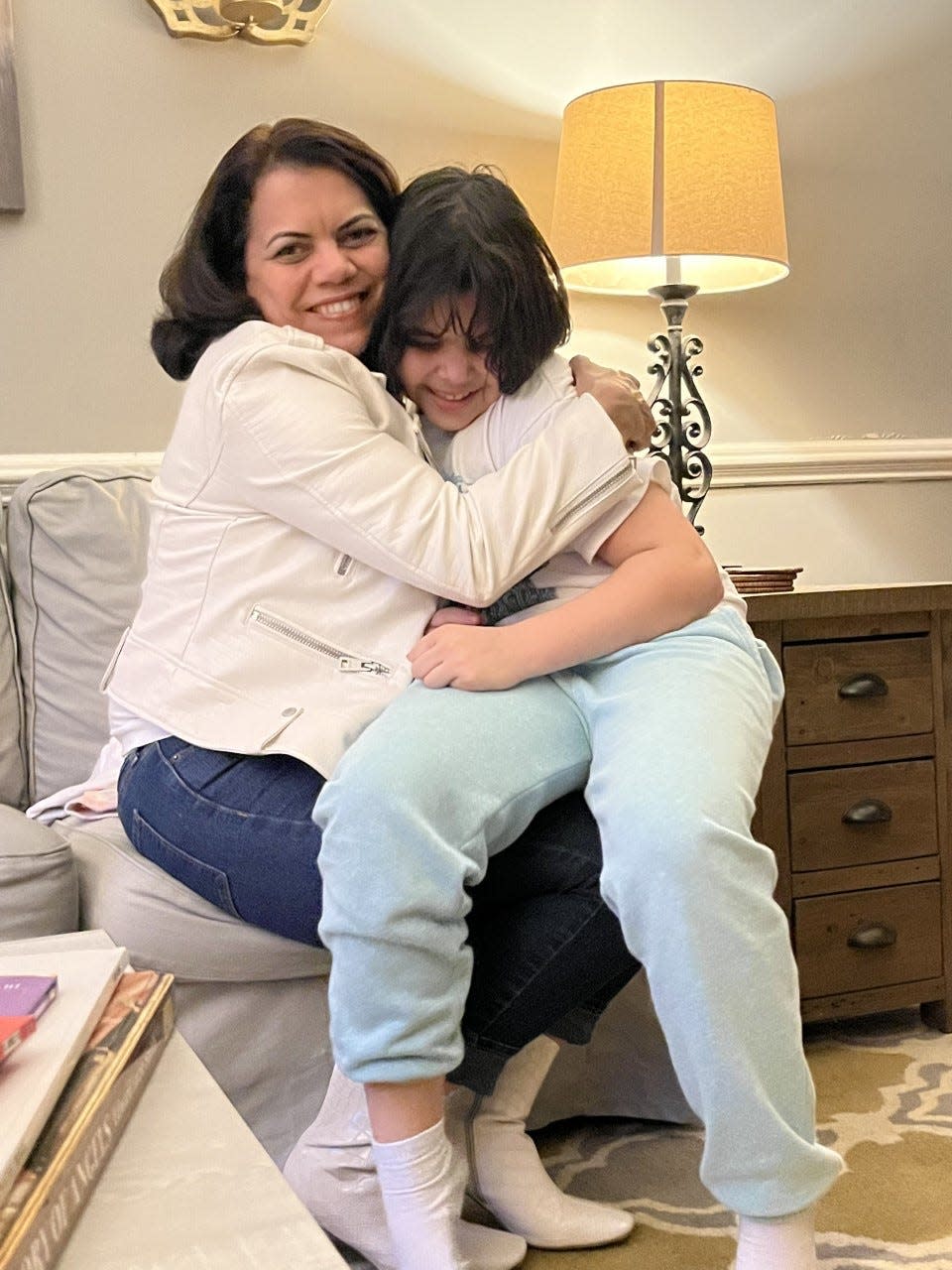Grumet: Texas families with transgender kids are 'refugees in their own country'
- Oops!Something went wrong.Please try again later.
- Oops!Something went wrong.Please try again later.
Kai Shappley already moved once to feel safe. Her mom expects they’ll have to do it again, this time leaving Texas for good.
“I love it here and I don't want to leave, but with what has happened now, I’m scared,” Kai, 11, told me Thursday, after Texas’ Republican elected officials once again decided it was politically expedient to target transgender kids like her.
Kai is a fifth grader who likes to roller skate, sew and play Roblox and Genshin Impact. She’s had a few acting roles, including appearing as Bailey in the Netflix series "The Baby-Sitters Club." She loves Dolly Parton (“Tell her to call me! I’ll be waiting!” Kai joked), and she co-hosts a weekly video chat posted on YouTube where she talks with other transgender youths. A finalist for Time Magazine’s Kid of the Year, Kai is a bright and generous child who would make any parent proud.
And our state is driving her away.
“We’re ready to move,” Kai’s exasperated mom, Kimberly Shappley, told me.
The latest directives by Attorney General Ken Paxton and Gov. Greg Abbott, declaring that gender-affirming care should be investigated as child abuse, signify election season posturing of the worst kind. Other Republicans quickly piled on: Paxton's primary challengers said they agreed with his legal opinion, and several GOP lawmakers and candidates said Abbott should call a special session so the Legislature can fully ban gender-affirming care.
This is not a stunt. Transgender children and their families live in fear of our state government upending their lives. Some say they won’t feel safe until they leave Texas.
In this infuriating turn of events, elected officials campaign on “Texas values” while targeting families with kids who need extra support. Politicians decree parents know best on masks and library books, but not on the most sensitive and personal aspect of their child’s medical care.
For the most part, gender-affirming care involves the use of puberty blockers, medications typically initiated between ages 9 and 14 to delay the onset of physical changes, such as menstruation or growth of facial hair. This treatment, which is reversible, provides time for youth to further mature mentally before deciding whether to receive hormone treatments, typically after age 16.
Doctors told state lawmakers last year that surgery is generally offered around age 18 and never to young children.
Every medical and mental health association you can think of, from the American Medical Association to the American Academy of Pediatrics to the American Psychological Association, supports access to gender-affirming care. Research has repeatedly found a reduced risk of depression and suicide among transgender youth who get the medical support they need.
Several district attorneys around the state, including Travis County’s José Garza, have declared they will not prosecute parents who seek such care for their children. The ACLU of Texas doubts any court would issue an order taking away someone’s child for this reason.
Shappley does not feel reassured. An overzealous child protection worker could still show up at her door.
Forced to flee the state
The Shappley family moved to Austin four years ago, after Kai’s elementary school in Pearland wouldn’t let her use the girls’ restroom and other parents made ugly threats. Last fall, after Texas lawmakers proposed a record 50 anti-transgender bills across three legislative sessions, Shappley started looking for nursing jobs out of state.
“We finally have roots in Austin, and moving again — I just don’t want to have to do it, but I can’t go through this anymore,” Shappley told me. “My daughter doesn’t deserve it. My family deserves to rest and relax and feel like we’re represented by the people in authority. But we don’t see ourselves in our elected officials. We don’t feel safe with them.”
The Shappleys are not alone.
“We’ve already received calls from trans youth and families across Texas who are scared and worried about what this news means for them,” said Amit Paley, executive director of the Trevor Project, which operates a 24/7 crisis hotline for LGBTQ youth. “It is heartbreaking to hear young people break down and express suicidal thoughts over a dangerous attack that directly contradicts the medical community’s professional guidelines on gender-affirming health care.”
Equality Texas, which works with LGBTQ families each legislative session to fight the growing tide of discriminatory bills, saw several families leave the state last year. Equality Texas CEO Ricardo Martinez said he knows of others who plan to move.
“It’s bad because nobody should have to be forced to flee their state,” Martinez said. “They’re essentially refugees in their own country.”
Shappley is especially frustrated because polls show a majority of Americans support transgender rights. Why do they keep electing leaders in Texas who are so hostile to these families?
“I don’t understand how you can be like, ‘I like all the other (GOP policies), I guess trans kids are worth the sacrifice,’” Shappley said.
Finding safety 1,500 miles away
Camille Mojica Rey spent half of last year fighting anti-transgender bills at the Legislature. Even though bills to block access to gender-affirming care did not pass, Rey felt it was time to leave Texas with her family, including her transgender son, Leon, now 9.
“These people in power are going to remain in power for the foreseeable future,” she said. “They’re not going to stop.”

Rey said it cost her family about $20,000 last August to move to Maryland, a state that has passed laws protecting LGBTQ rights. Her mortgage there is considerably higher than her old housing costs in Dripping Springs. Leon left good friends behind. Rey’s father, who had lived in Austin since 1976, sold his home and moved with the family.
“I feel like a political refugee,” Rey, a science writer, told me by phone this week. “And thank God I have a Ph.D. and a career that pays me well, that I could do this. I would not be able to do this if I was a minimum wage worker. How would I pull this off?”
Martinez, with Equality Texas, echoed that concern: Some families simply can’t pick up and move.
“If they do have to stay, they’re experiencing a really hostile climate, where in school they’re bullied and harassed or physically assaulted,” he said. Texas led the nation last year in the number of violent deaths involving transgender and gender nonconforming people.
And the painful reality is that many families are not as supportive as Kai's and Leon's. Only 1 in 3 LGBTQ youths say they live in a household that supports their identity, according to the Trevor Project's 2021 national survey.
Over the past week, Rey has seen LGBTQ allies extend offers on social media to help Texas families move. Even then, families have to consider where they’re moving to.
Nearly half of the country — 22 states, including Texas — received the lowest grade for LGBTQ rights on the Human Rights Campaign’s State Equality Index. In some places the landscape is worsening, with advocates saying 2022 could mark a new low amid the march of anti-trans legislation across the country.
The kids and parents I spoke with wished the public understood: Being transgender is not a choice. Rey pointed to studies showing the brain scans of transgender people bear a closer resemblance to the patterns of brain activity seen among members of the gender they identify with, not their gender at birth.

Rey expects science will continue to improve our understanding. But she said she will never feel completely at ease over her son's safety and mental well-being — "not because of him but because of how society (will) treat him."
Rey watched the headlines from Texas this past week with dread and heartache for the families still here. But she hasn’t told Leon about any of these developments. They moved 1,500 miles to get away from this stuff.
Leon is going skiing and ice skating this weekend with his dad. He should be free to think about kid things.
Grumet is the Statesman’s Metro columnist. Her column, ATX in Context, contains her opinions. Share yours via email at bgrumet@statesman.com or via Twitter at @bgrumet.
Help is here
This article originally appeared on Austin American-Statesman: Grumet: Texans with trans kids are 'refugees in their own country'

